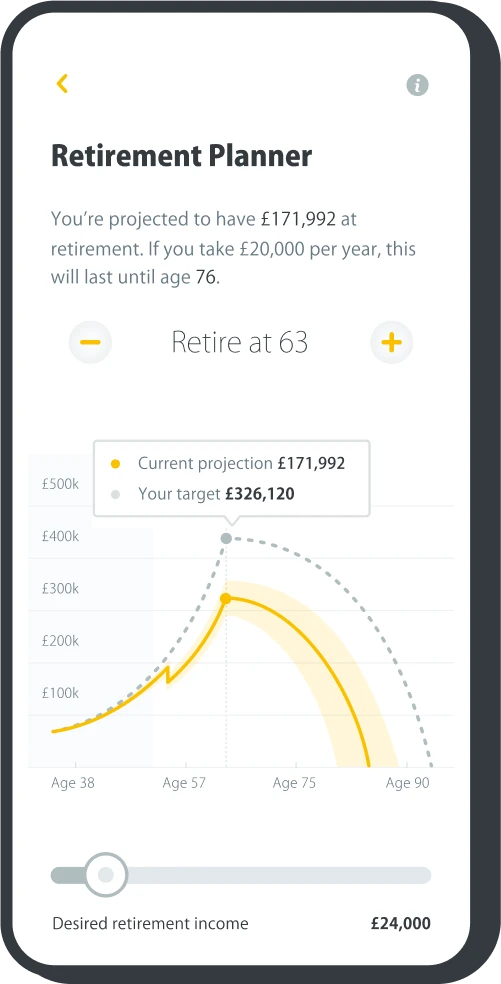Featured articles
Pension vs. savings account
Pensions and savings accounts offer different ways to save your money. While pensions are designed to save for retirement, savings accounts have broader uses and are typically easier to access. They’re often used for short-term savings because it’s easy to add and withdraw money, but they can also be used to save for longer-term goals, including retirement.
What are the key differences between a pension and a savings account?
How and when you can access your money is one of the key differences between pensions and savings accounts.
Saving into a pension can offer valuable tax advantages, but you usually can’t access your money until age 55 (rising to 57 from 2028). While pensions are less flexible, they can outperform savings accounts over time because they’re invested in the stock market. This means they have the opportunity to benefit from compounding and investment growth. Most pension contributions can also receive tax relief and, in many cases, employer contributions.
The age restriction on accessing pensions has both pros and cons. It helps your money stay invested and grow over time, but it also means that a pension isn’t suitable for money you might need soon.
Can I have a pension and a savings account?
You can have both a pension and a savings account - in fact, many people do. Having both can make sense because they serve different purposes and complement each other.
You can’t use your pension savings until your mid-50s, so it helps to keep some money in an easy-access account for short-term needs. But, you might have shorter-term goals - such as building an emergency fund or saving for a home - that require quicker access.
Some types of savings accounts, such as ISAs, can also offer tax advantages. You can save or invest up to £20,000 across all your ISAs (2025/26), and any interest or returns you earn are tax-free.
If you’ve already contributed up to your pension’s annual allowance and still have money left to save, an ISA could be another tax-efficient option.
Types of savings accounts
There are several types of savings accounts, each designed for different goals.
Easy access savings accounts
You can take money out of these accounts anytime without paying a penalty. They’re useful for emergency funds, short-term savings goals, or when you need flexibility.
Fixed rate savings accounts (including fixed-term bonds)
You ‘lock away’ your money for a set period - usually one, two or more years - at a fixed interest rate. These accounts often offer higher interest rates in exchange for limited access during the term. They can suit longer-term goals when you’re confident you won’t need to withdraw your funds early.
Individual Savings Accounts (ISAs)
ISAs let you save or invest up to £20,000 (2025/26), and any interest or returns are tax-free. You can have multiple ISAs, but your total annual contributions across them all can’t exceed £20,000 (2025/26).
- Cash ISAs work like a regular savings account but your interest is tax-free;
- Stocks and Shares ISAs let you invest in assets such as company shares and funds. The value of investments can go up or down, and you may get back less than you invest;
- Lifetime ISAs (LISAs) are designed to help people aged 18-39 save for their first home or retirement. You can contribute up to £4,000 annually until age 50, and the government adds a 25% bonus of up to £1,000 per year (2025/26); and
- Innovative Finance ISAs use peer-to-peer lending. Returns depend on the borrower repaying their loan, so your capital is at risk. This type of ISA isn’t covered by the Financial Services Compensation Scheme (FSCS).
Regular savings accounts
Regular savings accounts mean paying in money each month for a set time, like six or 12 months. They can help you build a savings habit, work towards a specific goal, or earn a higher interest rate on regular contributions.
Children’s savings accounts
Children’s savings accounts help young people start saving and learn about money. They’re often available as regular savings accounts or as Junior ISAs.
Junior ISAs come in two types: Cash and Stocks and Shares. Parents, guardians or other family members can contribute up to £9,000 per year (2025/26), but the account belongs to the child. They can begin managing it at age 16, but can’t withdraw money until they turn 18. This is when it automatically becomes an adult ISA.
Types of pensions
There are three main types of pensions, and it’s possible to have more than one.
State Pension
The full new State Pension is £230.25 per week, or £11,973 per year (2025/26). It usually increases each year under the triple lock, which links growth to inflation, average earnings or 2.5% - whichever is highest.
The amount you receive depends on your National Insurance (NI) record. To get the full new State Pension, you’ll need 35 qualifying years of NI contributions. You’ll need at least 10 qualifying years to receive any State Pension at all.
Many people find that the State Pension alone may not cover all their living costs in retirement. That’s why some choose to build additional savings or pension contributions during their working life.
Workplace pensions
Workplace pensions are arranged by your employer. Most modern schemes are defined contribution, where you and your employer both pay in. Some public sector employees may have a defined benefit or ‘final salary’ pension, although these are becoming less common.
- Defined contribution pensions - you and your employer contribute to a pension pot that’s invested in a range of funds. The amount you get at retirement depends on how much you pay in, how your investments perform, any tax relief, and how you take your pension. By law, most workers are automatically enrolled in a workplace pension, and employers must pay a minimum amount too.
- Defined benefit pensions - your retirement income is based on your salary and how long you’ve worked for your employer. Unlike defined contribution schemes, the employer promises a set level of income. If your employer goes out of business, the Pension Protection Fund (PPF) can step in to pay some or all of your pension. However, the amount you get may be less than what you were originally promised.
Personal pensions
Personal pensions are schemes that you arrange yourself. Most modern pensions are defined contribution pensions. This means your money is invested in the stock market and its value can go up or down depending on investment performance.
- Personal pension - you choose a fund and make either regular or one-off contributions. Your provider invests your money in a mix of assets such as stocks, bonds and cash. Returns depend on how these investments perform. Some employers offer Group Personal Pensions (GPPs) - a version of this managed by an employer on behalf of their employees.
- Self-Invested Personal Pension (SIPP) - SIPPs give you more control over your investments. You can choose where to invest, such as in company shares, funds, ETFs or property. SIPPs usually suit people who have more investing experience and time to manage their portfolio.
With both options, the value of investments can go down as well as up, and you may get back less than you invest.
Be pension confident.
Combine your old pension pots into one new online plan. It takes just a few minutes to sign up.
Get startedWhat are the advantages of pensions?
Pensions are designed to help you save for life when you stop working. They offer several benefits that support long-term saving.
Compounding returns
Compounding happens when your investment earnings are reinvested and start to earn returns of their own. Over time, this creates a ‘snowball effect’ where growth builds on growth. Because pensions are invested for many years, they naturally benefit from compounding. Starting early gives your money more time to grow - even small amounts can make a difference over the long term.
Tax relief
Most UK taxpayers receive tax relief on their pension contributions. This means the government adds a 25% top-up, so for every £100 you pay in, £125 goes into your pension. You can usually get tax relief on contributions up to 100% of your salary, within the annual allowance of £60,000 (2025/26).
Employer contributions
If you’re employed, your employers might also contribute to your pension to help it grow. Some match what you pay in, while others add a higher percentage. These contributions can make a big difference to your pension over time.
Under Auto-Enrolment rules, most employees are automatically added to a workplace pension if they:
- are aged between 22 and State Pension age;
- earn at least £10,000 a year; and
- work in the UK.
Both you and your employer pay into your pension. The minimum combined contribution is 8% of your qualifying earnings - with at least 3% from your employer and 5% from you (including tax relief).
You can choose to opt out, but you’ll usually be re-enrolled every three years. Contributions are based on qualifying earnings between £6,240 and £50,270 a year (2024/25 tax year)
A variety of income options
From age 55 (rising to 57 from 2028), you can begin taking money from your pension. How you do this depends on your needs and retirement plans. You could choose an annuity, which provides a guaranteed income that can be fixed, increasing or linked to inflation. Or, you could opt for drawdown. This means taking an income from your pension while keeping the rest invested, so it can keep growing with the market.
What are the advantages of savings accounts?
Simplicity and flexibility
Opening a savings account is easy, and you can access your money whenever you need it. They’re useful for short- or medium-term goals like building an emergency fund, making a purchase or covering surprise costs. Savings accounts also tend to have fewer rules than pensions, though some - like ISAs or fixed rate bonds - can be a little more complex.
How savings accounts are taxed
Some savings accounts, like ISAs, let your money grow without paying tax on the returns. Most people also get a Personal Savings Allowance (PSA). This means you can earn some interest tax-free each year - up to £1,000 if you pay basic rate tax, or £500 if you pay higher rate tax.
Key takeaways
Here are a few simple points to help you weigh up pensions and savings - and understand how each can support your financial goals.
- Saving for retirement early can help your money grow through compounding.
- Pensions offer tax relief and often receive employer contributions.
- Savings accounts can help with short- and medium-term goals because your money stays accessible.
- Pensions are designed for the long term and can benefit from potential investment growth.
- Many people use both a pension for later life and a savings account for short-term needs. This can help them feel more confident about the future.
Learn more about pensions, savings and investments.
Risk warning
As always with investments, your capital is at risk. The value of your investment can go down as well as up, and you may get back less than you invest. This information should not be regarded as financial advice.
Last edited: 22-10-2025







